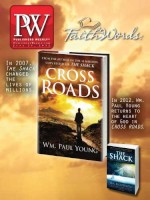The idea of excerpting a book to drum up interest is nothing new, but releasing excerpts in stages, based on the number of “likes” a book gets on Facebook, is a whole new ballgame for promotion in the digital age. Employing just this strategy, HarperCollins has driven 7,324 “likes” and 18,630 total views since early May to the Facebook excerpts of Into the Darkest Corner by Elizabeth Haynes, the inaugural book using the HarperCollins Like to Read application.
“The challenge we face when launching books via social media is not just to gather fans but to activate them, to turn them into evangelists for the book,” said Mark Ferguson, associate online marketing director at Harper. “Just providing an early excerpt to people who ‘like’ a page doesn’t offer any incentive to share. It can be a great way of getting existing fans excited, but it doesn’t help us to reach a new audience.”
To overcome that problem, HC commissioned Chicago-based agency Mess to help it build the Like to Read application, a multipurpose app that won’t release an excerpt until a specified number of “likes” have been hit; in the case of Haynes’s book, a new excerpt is released on Facebook each time the page gets an additional 500 fans. That benchmark was set after some trial and error last year with HC determining that 500 is a number that allows the publisher to release new excerpts “very consistently.” Harper is supplementing the excerpts by hosting a discussion with fans on Facebook. “We’re trying to grow a community and continue the conversation,” said associate marketing director Katie O’Callaghan. “We want the fans engaged, and invested. If they’re participating, and sharing their experience with their friends, then the content will always be fresh and relevant.”
Into the Darkest Corner isn’t the first book that Harper has promoted through Facebook sharing; last summer, a similar app (that was less sophisticated than Like to Read) drew nearly 10,000 fans for S.J. Watson’s Before I Go to Sleep, before the book went on sale. That novel, Watson’s debut, has gone on to sell more than 100,000 print copies in the outlets tracked by Nielsen BookScan. Voting-style excerpting was also used by Morrow for Simon Toyne’s Sanctus and Neal Stephenson’s Reamde, as well as a tool to grow Avon’s Facebook page by 5,000 fans.
With Haynes’s novel, Ferguson said, click-throughs on the buy link on the Facebook page occur at about the rate HC would expect from the average online advertisement. But what is far more important to Ferguson is “the velocity of growth in the U.S. fan base for a previously unknown, debut U.K. author.” Ferguson continued: “We aren’t requiring people to like the page in order to read content, which means that these are fans who have read part of the book and decided that they want to learn more about it in the future.”
The publisher has broad plans for Like to Read, and will employ it across five HC imprints. Harper’s goal, Ferguson said, “is to select books that we think are right for this particular strategy, namely fast-paced, addictive reads that are most likely to activate a fan in the short term and convert them to a buyer in the medium-to-long term.” But there’s no reason the app has to stick just to excerpts or just to one book. “If we have branding needs that must be met we can do so,” said Ferguson, “and we have considered using this as a way of distributing exclusive content.”



 Volume 259
Issue 26
06/25/2012
Volume 259
Issue 26
06/25/2012





